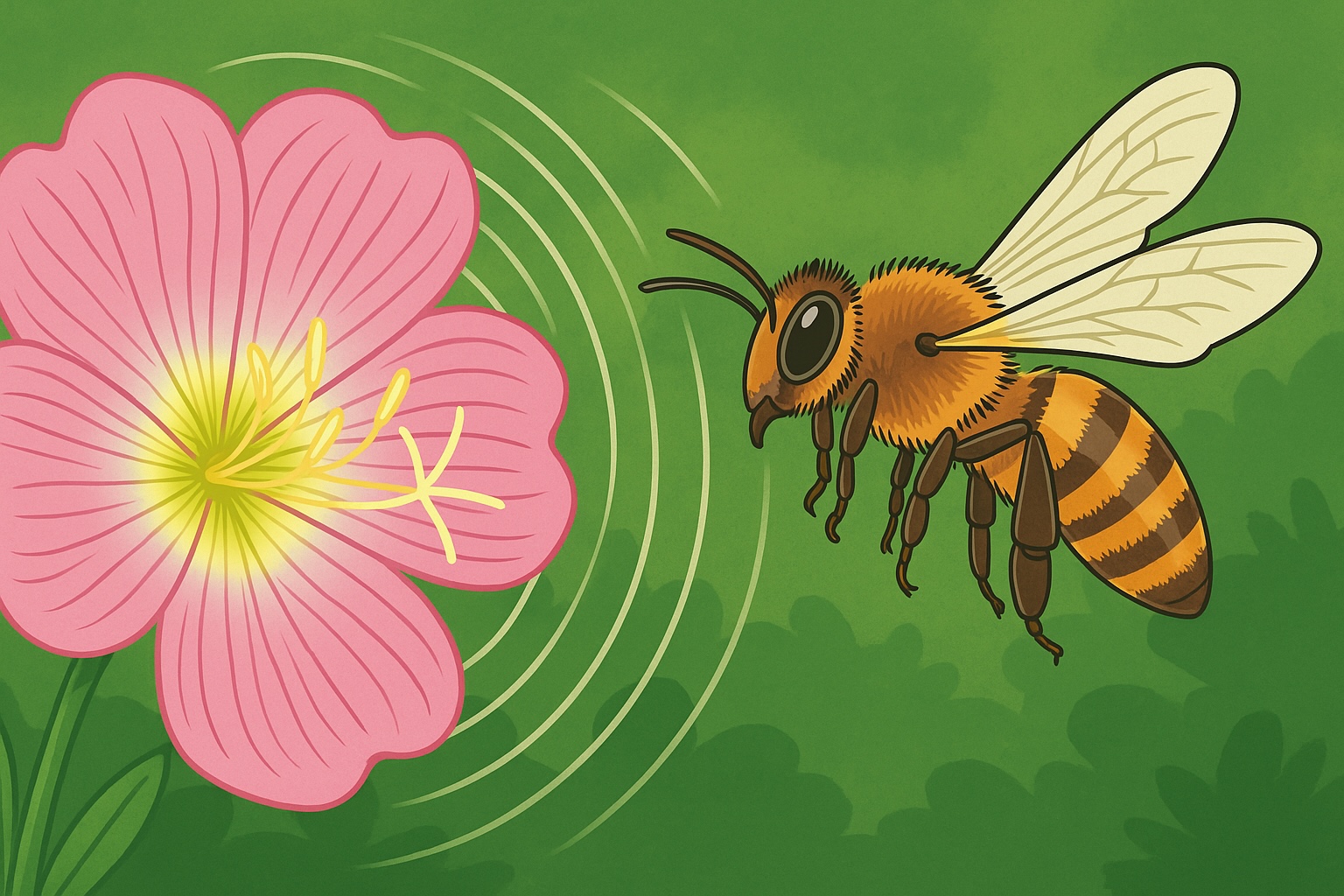Did You Know? Plants Can Hear Bees and Respond with More Nectar
When we think of sound, we often think of humans, animals, or maybe even the rustling of leaves in the wind. But recent research has revealed something truly astonishing—plants, it seems, can “hear” too. And not only do they listen, but they also respond. Specifically, some flowering plants can detect the buzzing of bees nearby and respond by producing more sugary nectar—a tactic to attract these essential pollinators more effectively.
The Science Behind Buzz and Bloom
In a 2025 study conducted by researchers at Tel Aviv University, scientists discovered that plants like evening primrose (Oenothera drummondii) can detect the frequencies associated with bee wingbeats. Within just three minutes of sensing this sound, the plant increases the concentration of sugar in its nectar by up to 20%—a significant jump that makes the nectar more appealing to pollinators.
This finding is groundbreaking because it challenges the long-held belief that plants are passive participants in their ecosystem. Instead, they appear to engage in real-time strategies to ensure survival and reproduction. Much like how animals use vision and scent, plants are now known to use sound as a tool for interaction with their environment.
How Do Plants Hear Without Ears?
Of course, plants don’t have ears, so how can they “hear”? The answer lies in their flowers. Flowers act like a natural microphone, picking up sound vibrations. When a bee buzzes nearby, the flower petals vibrate at the same frequency as the buzz. These vibrations trigger a response within the plant cells, which leads to changes in nectar production. It’s a form of plant bioacoustics—a field that’s just beginning to bloom in terms of research.
What Does This Mean for Pollinators Like Bees?
This adaptive response benefits both the plant and the pollinator. When nectar becomes sweeter, bees are more likely to return to that plant, ensuring better pollination. It’s a mutually beneficial relationship: bees get energy-rich food, and plants get a higher chance of reproduction.
But there’s a catch. Human activity, including noise pollution, pesticide use, and urban sprawl, can interfere with this delicate exchange. If the background noise is too loud or artificial, it can drown out the bee’s buzz, preventing the plant from hearing and responding appropriately.
Why It Matters for Our Ecosystems
Pollination is critical to global food production. About 75% of the world’s crops depend on pollinators like bees. Without them, fruits, vegetables, nuts, and even coffee would be in short supply. If plants can enhance their appeal to pollinators naturally, it could improve crop yields without synthetic chemicals or genetic modification.
Understanding how plants and pollinators communicate also gives us a powerful reminder: the ecosystems around us are complex, interwoven, and intelligent in ways we’re just starting to understand.
From Science to the Real World: The Role of Bee Conservation
Unfortunately, bee populations are under immense stress. Habitat loss, disease, invasive species, and climate change are all taking their toll. At All Bees Removal, we see firsthand how urban and suburban environments can unintentionally harm bees. That’s why we specialize in humane bee removal, ensuring that these vital insects are relocated safely and can continue their pollination work in healthier, more natural environments.
So, next time you see a bee buzzing by, know this: that little insect might be triggering a flower to sweeten up just for them. It’s a beautiful, silent conversation taking place in your garden, one buzz at a time.
How You Can Help
- Plant bee-friendly flowers: Native flowering plants provide the best food sources for local bees. Cosmos, lavender, and sunflowers are great options.
- Avoid pesticides: Many chemicals disrupt pollinators’ ability to navigate or even survive.
- Support humane services: If you have a hive in your home or on your property, don’t exterminate. Contact a professional, like All Bees Removal, who can safely and ethically relocate the colony.
- Reduce noise pollution: If you live near green areas, minimizing loud machinery can help pollinators communicate more effectively with plants.
The Bigger Picture: Evolution in Action
The idea that plants can hear and respond in real-time to their environment changes how we understand evolution. It’s no longer just about traits passed down over centuries. Some responses, like nectar enhancement, occur in real-time—showing how dynamic nature really is.
For example, bees tend to prefer flowers that offer high rewards. By sweetening their nectar only when bees are present, plants save energy and still win the pollination game. It’s an energy-efficient strategy, and one that speaks to the incredible adaptability of flora in the wild.
What This Means for Gardeners, Farmers, and You
If you’re a gardener, farmer, or just someone who loves the outdoors, this discovery gives you even more reason to care about your environment. The health of your plants may depend not just on sunlight and water, but also on the soundscape around them.
Whether you live in the city or countryside, creating pollinator-friendly habitats can make a huge difference. Even a small patch of flowering herbs on a balcony can serve as a mini-refueling station for bees.
And if you ever discover a hive too close for comfort, remember—there are compassionate ways to deal with it. Our team at All Bees Removal is always ready to help you coexist with nature rather than working against it.
Final Thoughts
This new understanding of plant-buzz communication is more than a scientific curiosity—it’s a call to action. As we continue to uncover how interconnected our world is, it becomes clear that protecting one part of the web—like bees—helps protect the whole.
So next time you hear a bee buzzing by, take a moment to appreciate the symphony of nature happening right around you. And know that somewhere nearby, a flower may be “listening”—and sweetening up its nectar just for them.
If you need safe, ethical bee removal that supports pollination health, contact All Bees Removal—because saving bees saves all of us.


